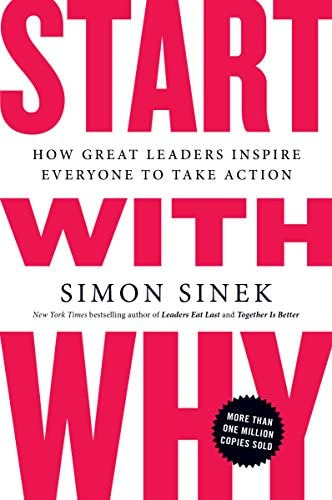Welcome to Polymathic Being, a place to explore counterintuitive insights across multiple domains. These essays explore common topics from different perspectives and disciplines to uncover unique insights and solutions.
Today's topic explores the power of answering the “why” in tasks and analyses, while also identifying how subversive that question can be to many leaders who never ask it or, worse, are successful because they don’t ask it. Let’s dive into the crazy world of a single-word question and find out how to use it to our success.
When I worked at a large Aerospace Company, I was part of a unique group within the discipline of Operations Research. Simply put, it’s a systems-of-systems approach to complex problem-solving that's critical to ensuring the right designs are developed by engineers to solve the user's problems. (For a deeper primer on OR, check out What Data Science Forgot)
I loved that this group's tagline was “Answering the Why before the What or How.” This simple, yet powerful idea sets a guiding principle, a North Star of sorts, for how we approach problem-solving. It’s not a new idea, and as Simon Sinek says in one of his books, “Start with Why.”

It’s also a powerful concept that I’d internalized as an officer in the Army leading troops on combat missions out of FOB Marez in Northern Iraq. In our daily mission briefs, I’d double-check the mission planning and briefing to ensure it aligned with one of my personal axioms as a way to lead, even if I didn’t survive the engagement:
I always owe my team the why, because the how might change, but the why will succeed even if I’m not there to see the end.
Simply put, “why” is not a nice-to-know; it’s essential to success. It’s also one of the more challenging elements to master because it requires you to step back from a problem and fully consider the broader implications and cascading consequences of your actions. This feature is also what makes it so subversive.
The Subversiveness of "Why?"
While I was at that Aerospace Company with the great tagline, I had a boss - let’s call her Renee to avoid too many pronouns - who, ironically, took the opposite approach. While I embraced understanding the why, she chafed at the question. During a meeting where our team was working on complex analysis problems related to kill web integration in the Joint All-Domain Command and Control (JADC2), I applied systems thinking and attempted to understand the rationale behind many of the studies. A lot of work was being done, but whether they aligned with anything useful was a wide-open question.
This wasn’t just a pedantic line of questioning, either. I’d previously had a boss who would confidently answer the wrong question because he never slowed down to define the right problem space. My goal was to provide the best answers to help our warfighters win.
Instead of rising to the opportunity and providing clarity, Renee looked at me and stated flatly, “I need you to stop asking that. I find asking ‘why’ to be disruptive.”
Suddenly, all of the resistance I’d been receiving against my attempts to define the Why became crystal clear. Asking why was akin to pointing out that the emperor had no clothes. Renee and her leaders were successful, well-regarded, and busy, constantly busy, churning out one analysis after another. Answering ‘Why’ would highlight how many times they’d answered the wrong question, responded to the wrong incentive, or frankly, didn’t understand the larger systems.
Asking why can be subversive because it’s hard and can highlight ignorance.
recently published the essay What Socrates Teaches Us About Love, Politics, and Death where they describe Plato’s understanding of how subversive that simple question can really be:During the trial, in Plato’s representation of it, Socrates went beyond simply defending himself against the official charges to argue that not even his accusers really believed that he was guilty of impiety or corrupting youth. Then why were they trying to put him to death? Socrates’s answer was: fear of being asked “Why?” He told the jury members who voted against him that they did so in vain. He told them they voted to kill him “in the belief that you would avoid giving an account of your life.” But imitators would rush forward to take his place, so that in the end “there will be more people to test you.” He claimed that “if you kill the sort of man I say I am, you will not harm me more than yourselves.”
Thankfully, I’ve not been in Socrates' place where death was on the line, but I’ve gotten burned pretty hard due to my subversiveness in asking “Why?” Regarding Renee, she disliked the question because it highlighted the functional stupidity within the organization and specifically shined a spotlight on her manifestation of being successfully unsuccessful, as all of her efforts struggled to make any useful impact.
Summary
If you’ve never slowed down to consider the “why,” there’s a high probability that the what or how of your action will be wrong. If you’re still regarded as successful, that “why” becomes a liability if someone asks the obvious questions. Sadly, too many leaders, even in organizations with a tagline like “Answering the Why before the What or How,” view the question as subversive instead of embracing the power that answering the Why unlocks.
As a leader, you should always answer the “why.” It provides a core element of how you provide direction, energy, and accountability to your teams to improve performance and produce the best products. As a team member, it’s essential for you to understand and align with the “why” so your efforts are fulfilling and rewarding.
Embracing the “why” is a superpower that expands your understanding of the world around you and is a key foundation of systems thinking. Whether it is viewed as subversive or not is an indicator of the health of your team because asking “Why” is a threat to incompetence.
Did you enjoy this post? If so, please hit the ❤️ button above or below. This will help more people discover Substacks like this one, which is great. Also, please share here or in your network to help us grow.
Polymathic Being is a reader-supported publication. Becoming a paid member keeps these essays open for everyone. Hurry and grab 20% off an annual subscription. That’s $24 a year or $2 a month. It’s just 50¢ an essay and makes a big difference.
Further Reading from Authors I Appreciate
I highly recommend the following Substacks for their great content and complementary explorations of topics that Polymathic Being shares.
- All-around great daily essays
- Insightful Life Tips and Tricks
- Highly useful insights into using AI for writing
- Integrating AI into education
- Powerful insights into the philosophy of agency










Kids naturally ask "Why? (to the point of driving parents crazy), and it's a pity that curiosity dries up later in life.
Though, not in my case, and you are so right that it's exactly like pointing out the emperor is wandering around naked. Not only do emperors hate it, so do the people pretending everything was okay because it points out their cravenness.
I always told my employees why we were doing something, otherwise as you point out, the task is basically pointless.
I have better phrase for you. “Come from?” When my very gifted child began talking it wasn’t mama or dada, it was “come from?” I have no idea how he even constructed that phrase at such a young age. He’d point at an object or living thing and ask that. It was exhausting but very effective. He’s an Aerospace engineer now.